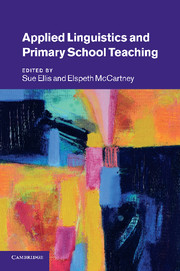Book contents
- Frontmatter
- Contents
- List of figures
- List of tables
- Notes on contributors
- Preface
- Editors' notes and conventions
- Introduction
- Part I Policy and diversity in the twenty-first-century primary school
- Introduction to Part I
- 1 The control of language or the language of control? Primary teachers' knowledge in the context of policy
- 2 Working with children who speak English as an additional language: an Australian perspective on what primary teachers need to know
- 3 Preparing for diversity: the alternatives to ‘linguistic coursework’ for student teachers in the USA
- 4 Supporting children with speech, language and communication needs
- 5 Foreign language teaching in the primary school: meeting the demands
- Part II The range and focus of applied linguistics research
- Part III Empowering teachers and teachers' use of knowledge
- References
- Index
Introduction to Part I
Published online by Cambridge University Press: 26 April 2011
- Frontmatter
- Contents
- List of figures
- List of tables
- Notes on contributors
- Preface
- Editors' notes and conventions
- Introduction
- Part I Policy and diversity in the twenty-first-century primary school
- Introduction to Part I
- 1 The control of language or the language of control? Primary teachers' knowledge in the context of policy
- 2 Working with children who speak English as an additional language: an Australian perspective on what primary teachers need to know
- 3 Preparing for diversity: the alternatives to ‘linguistic coursework’ for student teachers in the USA
- 4 Supporting children with speech, language and communication needs
- 5 Foreign language teaching in the primary school: meeting the demands
- Part II The range and focus of applied linguistics research
- Part III Empowering teachers and teachers' use of knowledge
- References
- Index
Summary
Part I identifies some key aspects of the changing landscape in primary education and how these are impacting on the everyday knowledge about applied linguistics that modern primary teachers develop. Its authors reflect on the need for this knowledge, the form that such knowledge can most usefully take, and the wider political and social questions of who decides what matters, why and how.
Some aspects of the changing landscape in primary education are outwith the control of teachers and educational policy makers, although they impact on their work. Jennifer Hammond notes a global concern with language and literacy achievement, but also that the biggest influences on achievement are located far away from the domain of the school or classroom. She focuses on one factor affecting language and literacy attainment, the number of children who speak a different language in school from the language(s) they speak at home. Jennifer Hammond writes from an Australian perspective about children with English as an additional language, but the issue is one that affects teachers, teacher educators, researchers and education policy makers across the western world. For example, in England, figures from the Department for Children, Schools and Families have shown that one in twenty schools now have native English speakers as a minority of their school population, and 600 of these schools have fewer than a third of native English speakers.
- Type
- Chapter
- Information
- Applied Linguistics and Primary School Teaching , pp. 17 - 20Publisher: Cambridge University PressPrint publication year: 2011
- 2
- Cited by



